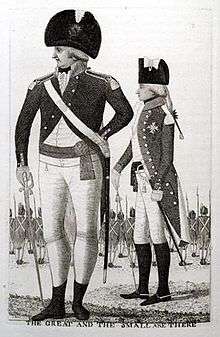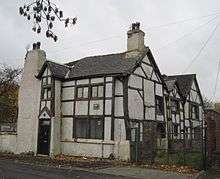Roger Aytoun

Major General Roger Aytoun was a soldier at the Great Siege of Gibraltar who came to notice when he married an ageing widow and was given Hough Hall in Manchester. Aytoun was known as Spanking Roger because of his love of fighting.
Life
Aytoun had the same name as his grandfather. His father was called John and his mother was Isobel and his maternal grandfather was Robert Rollo.[2] Aytoun took part in a race on Kersal Moor which traditionally was done with the competitors running without clothes. The race was run each Whitsun and the spectacle attracted large crowds and entertainers who transformed part of the moor into a giant fair. The sight of Aytoun's six-foot-four inch frame was said to have inspired a Manchester widow, Barbara Minshull, to propose marriage to him.[3] Minshull lived at Chorley Hall and she also owned Hough Hall and Garret Hall. Her fortune was due to her late husband who had been a successful apothecary. Roger Aytoun was given Hough Hall when they married in 1769.[4]
Aytoun was known to be addicted to both drink and gambling and he married the 65-year-old widow even though he was so inebriated that he needed assistance to stand at the wedding.[5]
Aytoun moved into his new bride's home which was Hough Hall in Moston in Manchester.
Aytoun's new bride lived for another fourteen years. He remarried after his first wife died to Jean Sinclair who was the daughter of John Sinclair of Balgregie.[2] He died at Inchdarney on 1 October 1810[6] and he was succeeded by his son.[2]
Legacy

Aytoun spent his fortune but his name is remembered in Aytoun Street in Manchester and there is a pub named the Spanking Roger. His image was captured by John Kay who drew Aytoun beside the future Charles X of France who was a foot shorter than he was.[1]
References
- 1 2 The Great and the Small Are There, John Kay, Scran, retrieved 21 February 2015
- 1 2 3 Aiton, William (1830). an inquiry into the origin, pedigree, & history of the family, or clan, of aitons in scotland; collection from various sources of information. p. 16.
- ↑ Lancashire, QI
- ↑ "Groom took the hough". Manchester Evening News. 4 October 2007. Retrieved 20 February 2015.
- ↑ McGarr, Ben (2013). The Manchester Book of Days. The History Press. p. 45.
- ↑ The Edinburgh Annual Register, Volume 2; Volume 3, Part 2, Page 364, Sir Walter Scott Ed. 1810